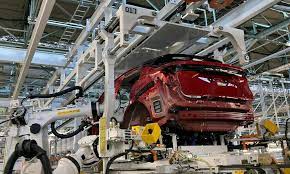TOKYO (Reuters): Japanese factory output improved in June for the first time in two months, government data showed on Monday, highlighting growing confidence among manufacturers buoyed by strong demand.
Many countries, including Japan, are relying on domestic consumption to underpin growth while the risk of global recession persists.
Output rose 2.0% in June from a month prior on a seasonally adjusted basis, missing the 2.4% median market forecast. That followed a revised 2.2% decline in May.
“Production is likely to continue to pick up on the back of resilient domestic demand, particularly for private consumption,” said Taro Saito, executive research fellow at NLI Research Institute.
“However, the pace of recovery is likely to be moderate due to continued sluggish export growth caused by slowdown in overseas economies.”
The figures tally with improvement in sentiment among big manufacturers in the second quarter as raw material costs peaked and the end of pandemic curbs lifted consumption, showed the Bank of Japan’s “tankan” survey released on July 3.
Still, concern about weakening overseas made manufacturers more muted in the Reuters Tankan poll published on July 19.
Production in the auto-related sector, which comprises a large chunk of corporate Japan, rose 6.1%. Sales both at home and abroad were strong, a Ministry of Economy, Trade and Industry (METI) official told a media briefing.
Output of trucks and parts, including gear systems, also contributed to the upward swing, the official said.
Toyota Motor (7203.T), Honda Motor (7267.T) and Nissan Motor (7201.T) reported increased global production in January-June as semiconductor supply eased.
Electronic components and devices output rose 6.8% as shipments of capacitors used in smartphones increased, the METI official said.
METI maintained its assessment of industrial output, saying “production is slowly picking up”. Manufacturers surveyed by METI expected output to fall 0.2% in July and increase 1.1% in August, the data also showed.
“We’ll continue to monitor the effects of the shortage of parts and materials and the impact of rising prices” in coming months, the METI official said.
Separate data showed retail sales rose 5.9% in June from a year earlier, in line with economist forecasts. Compared with the previous month, retail sales contracted 0.4%, following a 1.4% rise in May, the data showed.







